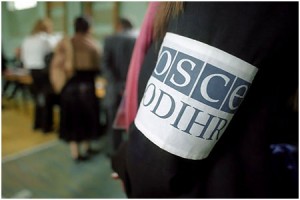And the winner is… reflections on elections at the UNFCCC
My colleague Mostafa already blogged about the spirit of the Arab spring taking over the negotiations, considering that Qatar is playing a key role in 2012-2013 as the upcoming host country of the annual climate conference and that Saudi Arabia chairs the most important negotiating body. After the developments of the past days, I guess one could extend the comparison to include a reference to the possibility for parties to select the chair of the new negotiating body (the Durban Platform - also called ADP) on the basis of a vote.
Let us recall the background… The countries established last December a new working body to negotiate a future protocol (or something similar) to be adopted in 2015. This new body would thus become the most important track for the climate negotiations in the years to come, and thus the selection of the chair is a particularly strategic matter for the continuation of the negotiations. Three countries originally expressed their interest for the position: Norway, Trinidad and Tobago, and India (you can find a post on our blog presenting the three candidates). Since the beginning of the Bonn session, the parties have however been totally unable to find an agreement on the name of the chair, sometimes even involving bitter fights. So on Wednesday night, after much frustration from all parts, the secretariat communicated that, in the absence of a common agreement, the selection of the chair would be put to a vote in accordance with the rules of procedures of the climate convention.
Never in the history of the climate change convention had a presiding officer been selected by voting. So all delegations rushed back to the rules of procedures and further guidelines provided by the secretariat. And rewarded they were! The guidance defines this procedure with so many details that it even mentions that a conference officer need to “demonstrate that the ballot box is empty, lock the box and retain the key until the end of the voting”. The rules of procedures also foresee the drawing of a lot in case of a tie… Seriously, can you picture 200 countries sitting in a majestic hall and casting their votes on small pieces of papers for the selection of the chairperson of the most important body of negotiations, only for the decision to finally rely on the drawing of straws?
 The rumors has it that the OSCE is actually considering sending an observation mission to monitor the election process… If the selection of the chair comes down this path, we would like to add our own contribution to the discussions on an equitable selection process: why not resort to SMS voting, on the model of the European Song Context which will take place tomorrow and will passionate about half of the continent (remember, according to the rules of the Eurovision one cannot vote for his national delegate - hence objectivity)?
The rumors has it that the OSCE is actually considering sending an observation mission to monitor the election process… If the selection of the chair comes down this path, we would like to add our own contribution to the discussions on an equitable selection process: why not resort to SMS voting, on the model of the European Song Context which will take place tomorrow and will passionate about half of the continent (remember, according to the rules of the Eurovision one cannot vote for his national delegate - hence objectivity)?
Actually, the only time that the countries were asked to cast a vote over the past fifteen years, the issue at stake related to the choice of the location of the secretariat. Against all expectations, the election designated Bonn as the host city for the UNFCCC. This bitter experience provides us with a very clear example of why one should not resort to voting: since years the meetings of the climate change negotiations have had to be squeezed in the halls of the Maritim hotel as the city of Bonn epically failed to build a new conference centre.
And just in case the matter was not complicated enough, it is also good to keep in mind that the rules of procedures have actually never been adopted because the countries disagree on the rule allowing for a vote to decide matters of substance. So since fifteen years, the rules have remained “draft rules being applied”.
Decision making at the UN Climate Talks normally involves the reach of a consensus among parties. While the definition of consensus stimulated a lot of discussions after the Cancun conference in 2010, it generally means the agreement of the large majority supported by the absence of explicit and persistent dissent (Anna Collins wrote a great post describing this discussion). In practice, it is highly unlikely that a vote actually takes place, but the fact that the possibility of a vote is even being discussed in Bonn only demonstrates the difficulty for the countries to bridge their differences and agree on procedural issues according to the usual fashion.
Back to the reference to the Arab spring, it is interesting to note that within the halls of the climate negotiations, the organizing of an election to designate a new president is actually considered as a negative prospect.
Update on Friday 25th May: on the last day of the negotiations in Bonn, the regional groups finally managed to avoid having to vote and agreed instead to the facilitation of the ADP working group to be lead by rotating chairs. You can find more details in the letter released by the COP president.
Images: Storynory, Armenian News




-
Clancy M
About the author
Sébastien Duyck
Passionate environmental advocate, PhD student (Human Rights and Environmental Governance). Following particularly UNFCCC, UNEP and Rio+20 processes
